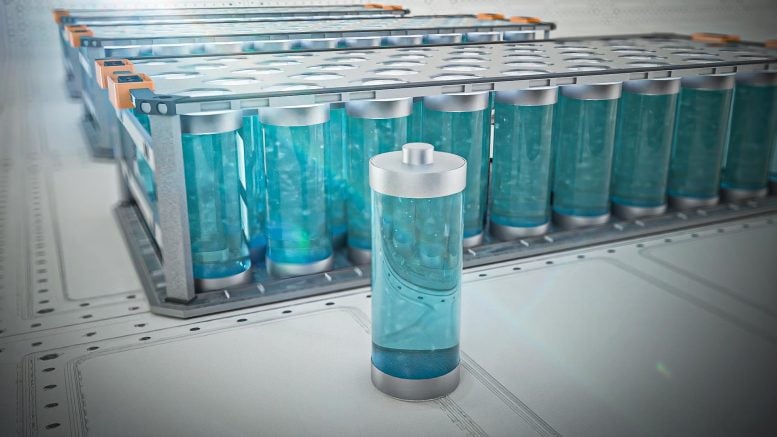
Water was silently sabotaging battery performance until scientists added salt.
By stabilizing the structure of water, sulfate salts stopped harmful chemical reactions and extended battery life by 10x. The fix is simple, scalable, and could reshape green energy storage.
Breakthrough in Aqueous Battery Lifespan
Researchers at King Abdullah University of Science and Technology (KAUST; <span class="glossaryLink" aria-describedby="tt" data-cmtooltip="
” data-gt-translate-attributes=”[{"attribute":"data-cmtooltip", "format":"html"}]” tabindex=”0″ role=”link”>Saudi Arabia) have identified a key molecular issue that has been preventing aqueous rechargeable batteries from becoming a safer and more cost-effective option for storing sustainable energy. Published in <span class="glossaryLink" aria-describedby="tt" data-cmtooltip="
” data-gt-translate-attributes=”[{"attribute":"data-cmtooltip", "format":"html"}]” tabindex=”0″ role=”link”>Science Advances, their study explains how water inside these batteries can damage performance and shorten lifespan. However, by adding inexpensive salts like zinc sulfate, the researchers were able to dramatically reduce this problem and extend battery life by over ten times.
A major factor that influences how long a battery lasts is the anode, the component where chemical reactions take place to produce and store energy. Unfortunately, certain unwanted chemical reactions, known as parasitic reactions, can damage the anode and shorten the battery’s overall lifespan.
The Water Problem Unveiled
The study reveals that free water molecules play a major role in triggering these harmful reactions. The addition of zinc sulfate helps limit the presence of free water, reducing its ability to degrade the anode.
“Our findings highlight the importance of water structure in battery chemistry, a key parameter that has been previously overlooked,” said KAUST Professor and Chair of the KAUST Center of Excellence for Renewable Energy and Storage Technologies (CREST) Husam Alshareef, the principal investigator leading the study.
What Is “Free Water”?
Free water describes water molecules that are not strongly bonded to other molecules. This state allows free water to engage with more molecules than otherwise, triggering unwanted reactions that consume energy and compromise the anode.
Sulfate was found to stabilize the bonds of free water, acting as what the KAUST team describes as a “water glue,” to change the dynamics of the water molecules that reduces the number of parasitic reactions.
While the bulk of experiments by the KAUST researchers were done on batteries using zinc sulfate, early investigation has shown that sulfate has the same effect on other metal anodes, suggesting the inclusion of sulfate salts into the battery design could be a universal solution for lengthening the lifespan of all aqueous batteries.
Simple, Scalable, and Cost-Effective
“Sulfate salts are cheap, widely available, and chemically stable, making our solution scientifically and economically viable,” said KAUST Research Scientist Yunpei Zhu, who conducted the bulk of the experiments.
Aqueous batteries are gaining significant global attention as a sustainable solution for large-scale energy storage and are projected to exceed a market size of $10 billion by 2030. Unlike lithium batteries, which are often used in electric vehicles, aqueous batteries offer a safer and more sustainable option for integrating renewable energy sources like solar power into electrical grids.
Reference: “Correlation of metal anode reversibility with solvation chemistry and interfacial electron transfer in aqueous electrolytes” by Yunpei Zhu, Simil Thomas, Tairan Wang, Xianrong Guo, Yizhou Wang, Chen Liu, S. Mani Sarathy, Xixiang Zhang, Osman M. Bakr, Omar F. Mohammed and Husam N. Alshareef, 25 July 2025, Science Advances.
DOI: 10.1126/sciadv.adx8413
Never miss a breakthrough: Join the SciTechDaily newsletter.
